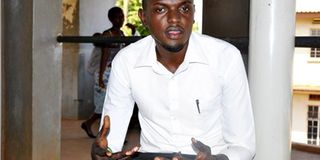The struggle to detect, treat and cure tuberculosis

Alex Omoding
What you need to know:
Twenty-six-year-old Alex Omoding was in his final year at Uganda Christian University, Mukono, when he got a multitude of infections which included tuberculosis. His condition later became drug-resistant. Ahead of World Tuberculosis day on March 24, he shares his story with Beatrice Nakibuuka.
“It started as an illness with fever while I was in the hostel at Uganda Christian University, Mukono, in 2012. I got some treatment from the university clinic but my condition did not improve. I decided to go to my home in Kiswa, a Kampala suburb, where I was diagnosed with pneumonia, malaria, typhoid and a hard cough, which I was told had lowered my immunity.
At another clinic in Kamwokya, the doctor told me I was suffering from a bacterial infection of the lungs and he gave me some medicines. I got treatment for the other diseases and they cleared but the cough worsened with each passing day. I went for TB and HIV tests and after a day, the results showed I had Tuberculosis. I was immediately started on TB first line drugs at Kiswa hospital in November 2012.
Education disrupted
I requested my relatives to notify the university officials of my illness and I applied for a dead year. When some of my classmates heard that I had tuberculosis, they thought I had HIV and only a few of them came to visit at home.
When I was diagnosed, I accepted I had tuberculosis and also came to terms with the fact that I was the only one who could help myself out. Whatever kind of medicine they brought me, I would take it without complaint. After a month (in December 2012) on the first line drugs and those from Kamwokya, the cough did not get any better.
From Kiswa Health Centre, I was referred to Mulago hospital. I had to start on another type of medication but since there were a few people on whom they had tried it, the doctors asked my uncle to sign an agreement, which stated that by taking the medication, there was a chance I could die after starting on the new type of medication because it was very strong.
I started taking the second line drugs in February 2013 after a month’s break from first line medicines I was getting from Kiswa. I had lost a lot of weight in a very short time (from 67 to 52kgs). The treatment consisted of seven months of daily injections, excluding Sundays.
In isolation
The doctors advised my uncle that I should have a separate room from the rest of the family members because my TB was very active. My uncle rented for me a room in Banda since the TB ward in Mulago was under renovation at that time. He also administered to me the daily injections because we would go to Mulago once a month.
There were some tablets given to me to reduce the side effects of the injected medicine but I felt they never worked. I got so weak. My legs got swollen and I could not walk. I would answer all of nature’s calls from where I was. The people who brought my food never entered my room if they had no mask. They would place my meals by the door. I used to be pushed around in a wheel chair whenever I was going to hospital for assessment.
Although my family tried to make me feel comfortable, I felt sad and desperate because I knew my friends were graduating.
The Direct Observation Therapy (DOT) is instructed for the caretakers of TB patients because the doctors know that the patient may refuse or dodge to take the medicine. At first, a family member would be around to make sure I had taken the medicine but they later trusted me because I knew I was risking my life by not taking it. I used to take the drugs in the evening after supper because they used to cause loss of appetite, blurred vision and a buzzing sound in my ears. Thus it was better to take them after I had eaten and rest afterwards.
Regaining health
After seven months of injections, my health got better. I had stopped coughing and my weight increased to 72kgs because my family used to feed me well. I continued with tablets for 17 months.
I resumed school in May 2014. By the time I did my exams, I was still on drugs but thank God I passed and did not get any re-takes even when I was not reading. I completed my medication on October 27, 2014 and got a certificate that I was free from TB and on October 31, I graduated. My appeal to people suffering from TB is that they must first accept that they have it and do their part in taking the medication correctly.”
Tb drug resistance
Drug resistance arises due to improper use of antibiotics in chemotherapy of drug-susceptible TB patients. This improper use is a result of a number of actions including, administration of improper treatment regimens and failure to ensure that patients complete the whole course of treatment. A patient who develops active disease with a drug-resistant TB strain can transmit this form of TB to other individuals.




